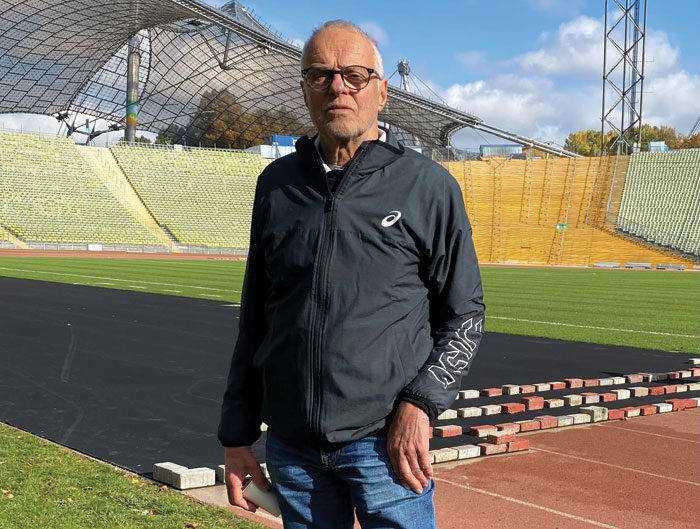 Lasse Virén at Munich Olympic Stadium last fall during the filming of documentary, ” 72- A Gathering of Champions.”
Lasse Virén at Munich Olympic Stadium last fall during the filming of documentary, ” 72- A Gathering of Champions.” Before the massacre that marred the 1972 Summer Olympics in Munich, there was a 23-year-old long-distance runner from Finland who wowed audiences with a remarkable comeback performance on the track.
Two days before Palestinian terrorists took eleven Israelis hostage, Lasse Virén ran in the men’s 10,000 meter finals. Although he tripped and fell during the race, he still managed to catch up, win gold and set a new world record.
His first Olympic gold medal became an afterthought as antisemitic terror came to the Olympic Village.
The Jewish Journal spoke (with translation assistance by his son Tuomas) with Virén, now 73, about what he witnessed as an athlete in the vicinity of the carnage.
“The first morning after the terrorist attack was very different compared to other mornings during the games,” Virén said. “All the gates to the Olympic Village were closed and guards were checking your athlete passes if you wanted to go through the gates. Previously, movement was very easy, athlete passes were not asked. After the attack, if you didn’t have yours with you, you had to go and get it from your room.”
The Finnish athletes had been housed close to the Israeli athletes, so Virén and his teammates never forgot the shock of the sudden and major police presence.
The Finnish athletes had been housed close to the Israeli athletes, so Virén and his teammates never forgot the shock of the sudden and major police presence.
“The security was much more visible and tighter after the attack,” Virén said. Even as a policeman in his home town of Myrskylä, nothing could prepare him for what he and his fellow athletes saw.
The games were suspended for 34 hours, starting on September 5th. Just after midnight the next day, the 11 Israeli athletes and a West German police officer were murdered. Mere hours later, over 80,000 people attended a memorial service for them at Olympiastadion.
Speakers at the memorial ceremony included President of the Federal Republic of Germany Gustav Heinemann, President of the International Olympic Committee Avery Brundage, Israeli delegation head Shmuel Lalkin and Israeli ambassador to West Germany, Eliashiv Ben-Horin.
“Shaken by the base crime which profanes the spirit of the Olympiad and the principle of worldwide solidarity, we call out from this place, over which waves the flag of the five rings, the flag of kinship, to all people of the civilized world and their governments, as well as to all international organizations, to proceed with all their power against the politics of murder, kidnapping and terror which the enemies of peace have been carrying on for years,” ambassador Ben-Horin said in his speech.
Athletic competitions resumed later that same day to much controversy.
“All the athletes were of course shocked after this, and how this kind of tragedy could happen,” Virén said of the mood among his fellow athletes. “Right after the attack, athletes were discussing with each other ‘could this cause the stopping of the Olympic Games?’ But then quite quickly, there came an official decision: the games will continue.”
Rosh Hashanah services had been planned for the Israeli team in the Olympic Village on September 8-9. Sadly none of them would attend, as the surviving Israeli Olympians departed Munich the day before.
On September 10th, Virén won his second gold medal of the games, taking first in the men’s 5,000-meter run, as famously depicted in the film “Prefontaine” starring Jared Leto. But the memory of the horror of Munich would follow Virén back to Finland.
Even in a country where today only about 1,300 Jews call home, the small Jewish community found a special kinship with their star athlete who was witness to such horror inflicted upon their fellow Jewish people on an international stage.
“I have been in contact with the Finnish Jewish community,” Virén said. “I’ve taken part in the memorial event of the tragedy here in Finland, and also visited the Maccabiah in Israel a few times. I have good contacts and warm memories with the Jewish community.”























 More news and opinions than at a Shabbat dinner, right in your inbox.
More news and opinions than at a Shabbat dinner, right in your inbox.